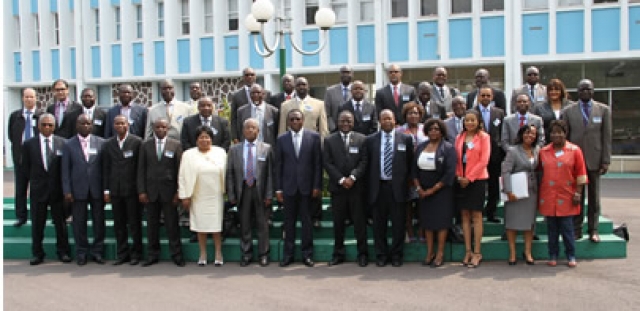64th Session of WHO AFRO Programme Subcommittee begins in Brazzaville, Congo
 Brazzaville, 9 June 2014 – The 64th session of the Programme Subcommittee (PSC) of the World Health Organization (WHO) in the African region, began today in Brazzaville, Congo. The five-day meeting is attended by public health experts from sixteen countries in the African Region and Dr Djamel Fourar, Director of Communicable Diseases in Algeria, was nominated as Chairperson.
Brazzaville, 9 June 2014 – The 64th session of the Programme Subcommittee (PSC) of the World Health Organization (WHO) in the African region, began today in Brazzaville, Congo. The five-day meeting is attended by public health experts from sixteen countries in the African Region and Dr Djamel Fourar, Director of Communicable Diseases in Algeria, was nominated as Chairperson.
The Committee, which is a subsidiary body of the WHO Regional Committee, will review regional strategies, technical reports and resolutions proposed by the Regional Director for consideration by the forthcoming WHO Regional Committee to be held in Cotonou, Benin from 1-5 September 2014.
In his remarks at the opening session, Dr Luis Sambo, WHO Regional Director for Africa, highlighted the key agenda items to be reviewed by the PSC including the Regional Strategic Plan for Immunization 2014-2020, situation analysis and perspectives of Viral Hepatitis in the African Region; the African Public Health Emergency Fund and progress towards the attainment of the Millennium Development Goals (MDGs).
On immunization, Dr Sambo noted that in spite of the progress made in immunization, many challenges remain to be addressed. There are gaps in immunization coverage that have led to a resurgence of measles and wild polio virus (WPV) outbreaks. The Regional Director pointed out that the “Reach Every District” strategy which can be credited for having improved vaccination coverage needs stronger focus to reach out to every child. He underscored the need for improving community awareness of immunization to stimulate strong demand.
“I think the ambitions of the new Regional Immunization Strategic Plan 2014–2020 should better articulate the roles of governments, communities, and partners in providing financial and other forms of support for vaccination activities in strengthening health infrastructure and in providing integrated health care including immunization at the local level”, said Dr Sambo.
Dr Sambo drew attention to the gradual spread of viral hepatitis which is a matter of public health concern. He told participants that unfortunately there is no reliable data but available evidence shows that Hepatitis A,B,C, D, and E is a challenge that requires urgent attention in the African Region. To tackle it, a range of actions has been proposed including raising public awareness, improving data collection, strengthening primary prevention as well as improving access to testing, care and treatment.
Turning to the African Public Health Emergency Fund (APHEF) established in 2012, the Regional Director said that only eight countries have contributed a total of over 3.6 Million US dollars to the Fund. These contributions have so far supported life-saving interventions in countries like the Central African Republic, South Sudan, Burundi, Zimbabwe, Guinea, Cameroon and Liberia. He called on African governments to make more efforts to make their contributions in time in order to sustain and even expand the benefits of the Fund.
Reminding participants that the deadline for achieving the Millennium Development Goals (MDGs) was fast approaching, Dr Sambo said that although most countries in the Region had made more progress in the new Millennium than during the 1990s, available evidence indicated that many countries were unlikely to achieve the health MDG targets. A report submitted to the Programme Subcommittee proposes actions that countries need to take towards reaching the MDGs targets. These include; renewed commitment to improve the performance of health systems, scaling up of cost effective interventions to meet the health needs of people, among others.
Concluding his remarks, Dr Sambo reiterated his confidence that the PSC members would use their expertise and experience to formulate actionable proposals that will assist the next session of the Regional Committee to respond to the needs of Member States.
_______________________________________________
For more information, please contact:
Dr Marion Motari + 4724139910 E-mail: motarim [at] who.int
C. Boakye-Agyemang + 4724139420 E-mail: boakyeagyemangc [at] who.int


